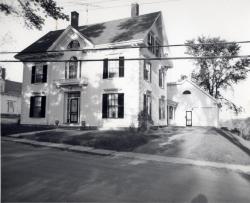
The Overlock House, Thomaston, ca. 1960
Thomaston Historical Society
Many local businessmen and lawyers gained state and national recognition. William Keith sold a lot with a partially constructed house at the corner of Robinson and Main Street to a friend and business acquaintance of Henry Knox, Benjamin Bussey of Boston, MA. Bussey completed the house and in 1844 sold the property to Captain Edward Robinson, a successful captain and shipbuilder elected to Congress in 1836, later a presidential elector and candidate for governor of Maine. Jonathan Cilley, a United States Congressman and brilliant attorney, who lived a few houses to the east of Robinson, was killed in a duel near Washington, D.C. in 1838, at which time Robinson was elected to fill the remainder of his term. Following this tragic incident, duels became illegal and were no longer accepted as a means of settling disputes.

The Honorable John Ruggles, Thomaston, 1859
Thomaston Historical Society
John Ruggles, Esq., another prominent lawyer, after graduating from Brown University moved to Thomaston in 1818, where he spent a long and successful career as lawyer, magistrate and statesman. A small office building sat below his house on East Main Street, near the house of Jonathan Cilley, at one time one of his students. In 1837, as a United States Senator, John Ruggles initiated legislation creating the Patent Office as we know it today, holding the first patent in the newly revised patent system.

Knox House, Thomaston, 1870
Thomaston Historical Society
Honorable John Holmes, second husband of Caroline Knox Swan (daughter of General Knox) and eminent lawyer and statesman, left politics in 1833 and returned to the practice of law in Thomaston. He was Inspector of the State Prison in Thomaston, took an active interest in town affairs and was involved in the schools and the Theological Seminary Institution, which moved to the Knox Hotel in 1838.

Prison Corner, Thomaston, ca. 1871
Thomaston Historical Society
Benjamin Carr, Prison Warden from 1839-1850, and Edward O’Brien, shipbuilder and owner, built the Carr & O’Brien block in 1852 on the former site of the Paine store at the corner of Wadsworth and Main Streets, in which the new George's National Bank and Georges Insurance Offices were installed. Throughout the years this building housed various shops, a sailmaking loft, a boot and shoe factory, a clothing factory and today serves as the showroom for the Maine State Prison.
<- Prev. Page ........................ Next Page ->